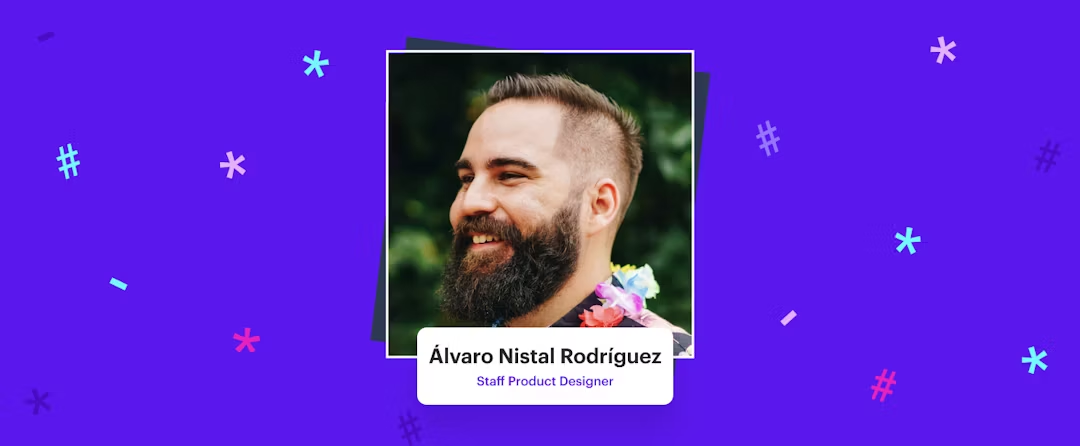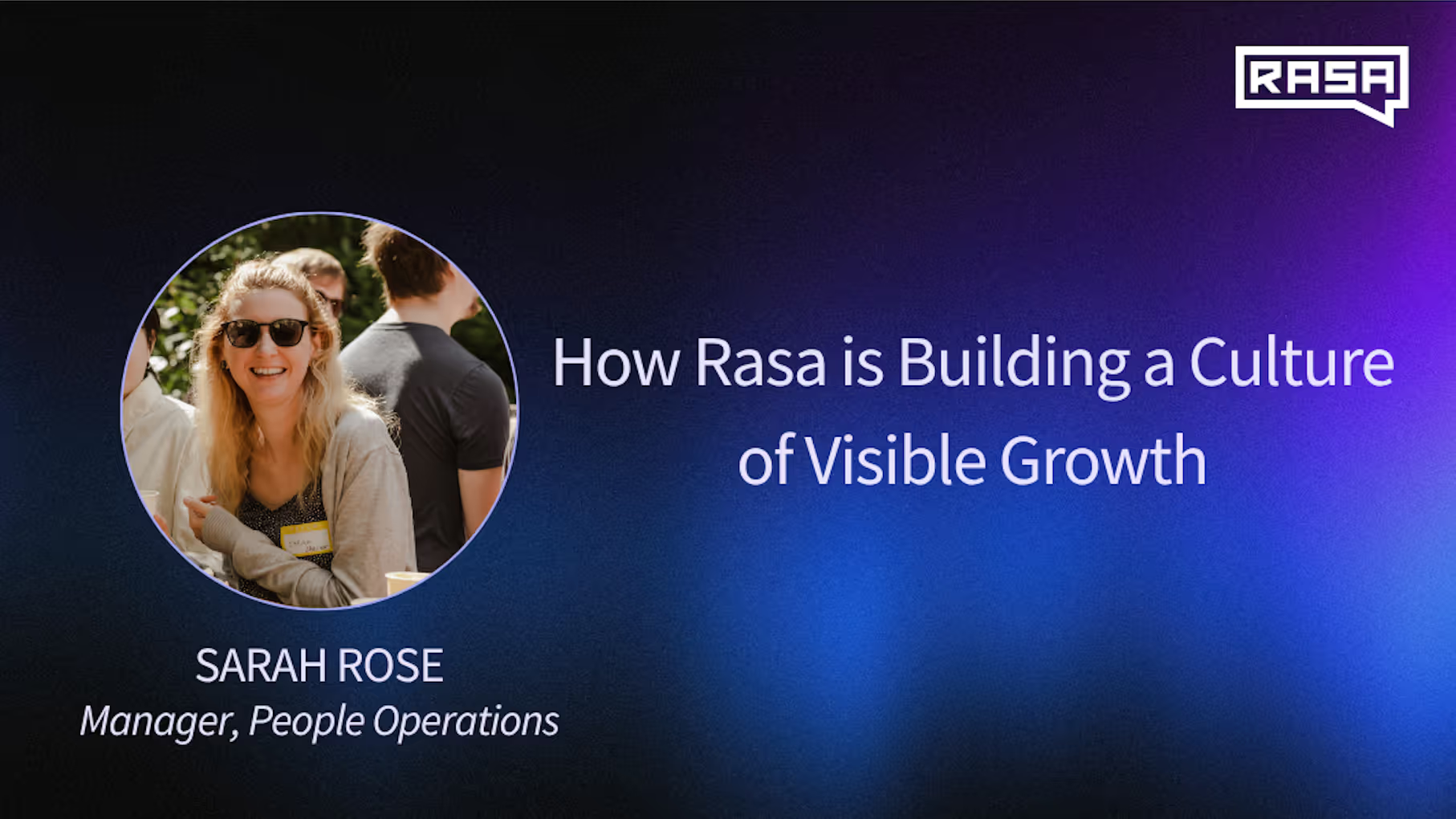1. Hi, Álvaro. Tell us about yourself! What was your path to joining Rasa?
Quite the rollercoaster of experiences! From very early on in my student days I was always fascinated with the fact that I could make pretty much anything I wanted using a computer, so my experience was always tied to them.
I started designing posters and flyers for various different clubs in my hometown, back in Spain, which in turn led to one of my passions which was becoming a DJ. These two jobs combined gave me enough money to drop out of high school and fund studying a private course focused on my main passion (and now career), design at CEADE Leonardo in Seville.
During the 3-year course, I started a part-time internship at a local design agency building marketing websites and designing graphics for small, local businesses. I quickly became aware that graphic design was not something I enjoyed, instead I was more excited about my analytical and technical skills, that I wasn’t able to use. So I drifted away from graphic design and focused my efforts on becoming a product designer.
My first product design job wasn’t actually in Spain, but in the UK, at a small charity fundraising platform as a first design hire in a team of 5 engineers. I learnt very quickly how to work closely with multiple sides of the business and engineers, as well as get grips on my English skills.
Since then, it’s been eleven years growing as a product designer working in-house on IoT, startups, banks, one of the “big four”, and also contracting at some design agencies. That’s the beauty of working as a product designer: it doesn’t matter what industry you work in, you’re solving user experience problems for customers, and you get to learn about them first-hand. And all of this builds a mental library of experiences that will help you in your next job.
2. Take us through a typical day as a Staff Product Designer. What types of projects do you work on?
I guess my usual tasks could be split into three areas.
- The first one is working on discovery, research and design for completely new features, which it’s usually done in collaboration with a product manager. This takes most of my time, as there are many moving parts to this process, including talking to customers, internal stakeholders and engineers, facilitating workshops, running user research studies.
- The second is working with engineers on features that are being built, which means I need to join different engineer-focused ceremonies, provide designs for any edge cases discovered, and testing the build so the user experience is as expected.
- The third one is working on the strategy of our next-generation no-code UI product, in collaboration with Clem, our Director of Product. This means keeping an eye on and, if necessary, challenge decisions that are made not only in features I work on, but in every feature built for our product.
3. Which areas of your work are you most passionate about?
At the start of my career my answer to this question would’ve been UI design and engineer hand-off.
Now I’m mostly passionate about product strategy and discovery, which, in my opinion, go hand-in-hand, as we are ultimately building a product for our customers in an extremely complex and fast-evolving industry, so it means that every strategic decision needs to be backed up by our customers.
4. What’s an important problem you’re solving at Rasa?
How to build and optimise an AI assistant without writing a single line of code, and with as little help as possible from ML engineers and developers.
5. How would you describe Rasa in three words?
Ambitious, Passionate, Supportive
6. How do you collaborate with other teams at Rasa?
We’re a remote-first company, so that means we rely heavily on Zoom and Slack catch ups. We do, from time to time, come together for product-wide gatherings that we use to organise workshops and solve some more general problems.
7. What does a culture of diversity mean for you at Rasa?
Working as equals, being able to comfortably express your views, and having those taken as seriously as anybody else, no matter your race, accent, gender or sexual orientation.
8. How has working at Rasa helped your professional development?
I’m one that’s always looking for new challenges when it comes to work. Having worked in several different industries, I’m keen on learning about new problem spaces. But Rasa has been the biggest challenge so far.
When you join, everyone jokes about the learning curve, and it’s actually not a joke. Even for someone like me, that had previously worked on applying AI to enterprise product, and has some technical knowledge, not having worked on Conversational AI made the learning curve steep. The support network and the intelligence of pretty much any Rasa were key to soften this learning curve.
Working at Rasa made me realise even stronger how important your network of team mates is for your own success and professional development. I cannot imagine how else would I had overcome the countless challenges I’ve faced when creating solutions for our customers.
9. What’s the most interesting thing you’ve learned lately?
The world of AI and LLMs of course! It will not only change the way our customers will build and optimise their assistants, but it has also improved the way we work towards our goals. Being able to spend more time talking with our customers and thinking about how to solve their problems instead of menial tasks that can now be automated and make use of Large Language Models in the product design process for research, prototyping, etc.
It’s an exciting time to be working in tech, and more specifically Conversational AI.
10. What’s the best career advice you’ve received?
I have two that I constantly remind myself about.
- First is saying no at the right time. Saying no is sometimes daunting, specially in remote working settings, but it saves a lot of time and mental strain to every team mate involved. Say no early and promptly instead of pushing an important presentation at the eleventh hour, failing to meet a deadline or launching a poor user experience.
- Second is not being scared of asking feedback from your team mates and manager often. Got positive feedback? Yay! Screenshot these and save them on a special folder named YOU ROCK, so you can look at it everytime you’re stuck or deflated. Got negative feedback? Make a special mission of yours to focus on it, don’t take it personally, and use it to grow as a professional in the right areas. Your team mates and your manager will appreciate it.
Thanks, Álvaro! You can find Álvaro on LinkedIn.


.avif)




